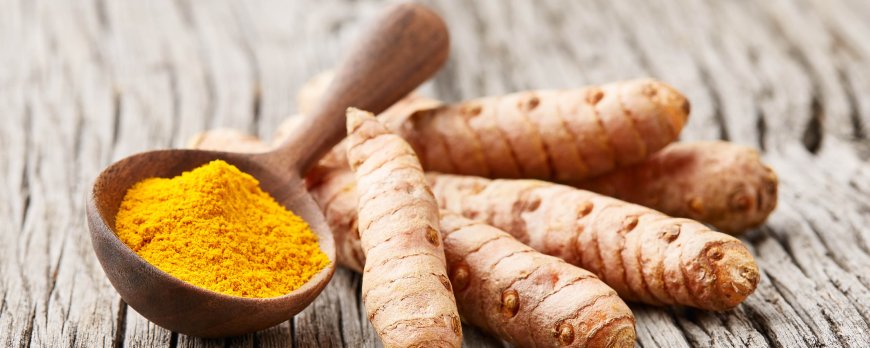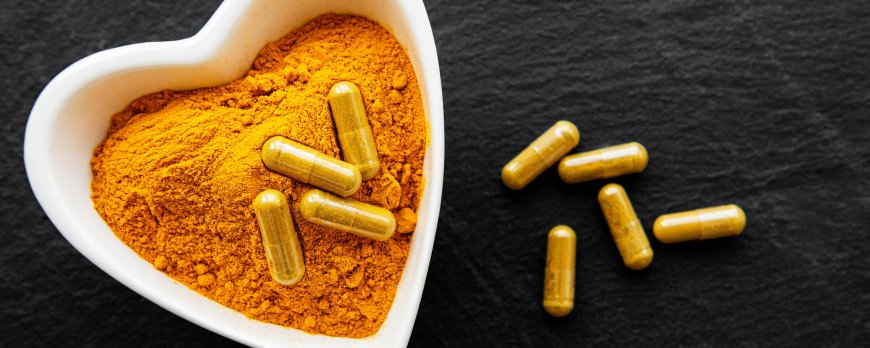Does turmeric help with inflammation?
Explore the answer to 'Does turmeric help with inflammation?' Learn about turmeric's potential anti-inflammatory benefits and the science behind it.

Does turmeric help with inflammation?
Turmeric, known for its active compound curcumin, is often touted for its potential anti-inflammatory properties and its ability to provide relief from inflammation-related conditions. Some studies have found that turmeric may have benefits in managing osteoarthritis, reducing cholesterol and triglyceride levels, and lessening symptoms of rheumatoid arthritis. It may also show promise for certain cancers, Crohn's disease, depression, diabetes, joint pain, and irritable bowel syndrome.
While turmeric is generally safe when consumed in moderate amounts, turmeric supplements should be approached with caution due to potential risks and interactions with medications. It is advisable to consult with a healthcare provider before considering turmeric supplements, especially for individuals with pre-existing conditions or those taking medications.
Instead, incorporating turmeric into meals as a flavorful spice is a safer way to consume it. Combining turmeric with black pepper can enhance its absorption. Turmeric extract has been found to be comparable to a daily dose of ibuprofen in managing pain and improving movement in individuals with osteoarthritis. However, it's important to note that more research is needed to fully understand the effectiveness of turmeric as an anti-inflammatory.
Key Takeaways:
- Turmeric, with its active compound curcumin, is believed to possess anti-inflammatory properties.
- Some studies suggest that turmeric may help in managing osteoarthritis and reducing cholesterol and triglyceride levels.
- Turmeric may also show potential benefits for conditions such as rheumatoid arthritis, certain cancers, Crohn's disease, depression, diabetes, joint pain, and irritable bowel syndrome.
- Turmeric supplements should be approached with caution and healthcare provider consultation is advised, especially for individuals with pre-existing conditions or those taking medications.
- Incorporating turmeric as a flavorful spice in meals, particularly when combined with black pepper, is a safer way to consume it.

The Science Behind Turmeric's Anti-inflammatory Properties
Research suggests that curcumin, the primary active compound in turmeric, exerts its anti-inflammatory effects by inhibiting various inflammatory molecules and pathways in the body. These anti-inflammatory properties make turmeric a promising natural remedy for reducing inflammation and potentially alleviating pain associated with various conditions.
Curcumin has been found to target multiple inflammatory signaling pathways, including those involved in the production of pro-inflammatory cytokines, enzymes, and proteins. It also acts as a potent antioxidant, helping to neutralize free radicals and reduce oxidative stress, which can contribute to inflammation.
Modulating Inflammatory Response
One of the key mechanisms through which curcumin exerts its anti-inflammatory effects is by inhibiting the activation of NF-κB, a transcription factor that regulates the expression of genes involved in inflammation. By preventing NF-κB from entering the nucleus of cells, curcumin helps to dampen the production of inflammatory molecules.
Furthermore, curcumin has been shown to inhibit the production of specific enzymes, such as cyclooxygenase-2 (COX-2) and 5-lipoxygenase (5-LOX), which are involved in the synthesis of pro-inflammatory substances like prostaglandins and leukotrienes. By blocking these enzymes, curcumin helps to reduce inflammation at the molecular level.
Potential Benefits in Various Conditions
The anti-inflammatory properties of turmeric, specifically curcumin, have been studied in a variety of conditions. While research is still ongoing, there is evidence to suggest that turmeric may have potential benefits for reducing inflammation in osteoarthritis, rheumatoid arthritis, Crohn's disease, and certain cancers.
In addition, curcumin has been shown to enhance mood and reduce symptoms of depression by modulating inflammatory pathways in the brain. It may also help improve insulin sensitivity and reduce inflammation associated with diabetes and metabolic syndrome.
It's important to note that more research is needed to fully understand the extent of turmeric's anti-inflammatory effects and its specific effectiveness in different conditions. Consulting with a healthcare provider is advised before incorporating turmeric into your routine or considering turmeric supplements, especially if you have pre-existing conditions or take medications.

Turmeric's Potential Benefits for Osteoarthritis
Several studies have suggested that turmeric may be beneficial in reducing inflammation and improving symptoms in individuals with osteoarthritis. The active compound in turmeric, curcumin, has been shown to have anti-inflammatory properties that can help alleviate pain and enhance joint function. Turmeric extract has even been found to be comparable to a daily dose of ibuprofen in managing osteoarthritis symptoms.
In addition to its potential role in reducing inflammation, turmeric may also have other benefits for individuals with osteoarthritis. Research indicates that turmeric may help lower cholesterol and triglyceride levels, which are important factors in cardiovascular health. It may also help alleviate symptoms associated with rheumatoid arthritis, another inflammatory joint condition. Furthermore, turmeric has shown promise in preliminary studies for conditions like Crohn's disease, certain cancers, depression, diabetes, joint pain, and irritable bowel syndrome.
Turmeric's Potential Benefits for Osteoarthritis Include:
- Reducing inflammation and pain
- Improving joint function and mobility
- Lowering cholesterol and triglyceride levels
- Alleviating symptoms of rheumatoid arthritis
- Potential benefits for other inflammatory conditions
It is important to note that while turmeric has shown potential benefits for reducing inflammation, there is still limited evidence to fully support its effectiveness. Therefore, it is recommended to consult with a healthcare provider before incorporating turmeric into your regimen, especially for individuals with pre-existing conditions or those taking medications.
When consuming turmeric, it is generally safe to use it as a spice in cooking and beverages. Combining turmeric with black pepper can enhance its absorption in the body. However, caution should be exercised when considering turmeric supplements, as they may increase the risk of kidney stones and can interact with certain medications. It is always best to consult with a healthcare provider for personalized advice.
In conclusion, turmeric shows promise as a natural remedy for reducing inflammation and improving symptoms in individuals with osteoarthritis. While more research is needed to confirm its effectiveness, adding turmeric as a flavorful spice in meals can provide potential health benefits along with enhancing the taste of various dishes.

Other Conditions and Potential Benefits of Turmeric
Apart from its potential benefits in managing osteoarthritis, turmeric has been studied for its potential effectiveness in addressing several other conditions associated with inflammation. The active compound in turmeric, curcumin, exhibits anti-inflammatory properties that may contribute to its therapeutic effects.
Here are some other conditions for which turmeric has shown promise:
- Rheumatoid Arthritis: Some research suggests that turmeric may help alleviate symptoms of rheumatoid arthritis, such as joint pain and swelling.
- Crohn's Disease: Turmeric may help reduce inflammation in the digestive system and alleviate symptoms associated with Crohn's disease, a chronic inflammatory condition.
- Certain Cancers: Preliminary studies indicate that curcumin may have anticancer properties and could potentially inhibit the growth of certain types of cancer cells.
- Depression: Turmeric may have mood-enhancing effects and could potentially be used as an adjunctive treatment for depression.
- Diabetes: Some studies suggest that turmeric may help regulate blood sugar levels and improve insulin sensitivity in individuals with diabetes.
- Joint Pain: The anti-inflammatory properties of turmeric may help reduce joint pain caused by conditions like osteoarthritis and rheumatoid arthritis.
- Irritable Bowel Syndrome: Turmeric may help alleviate symptoms of irritable bowel syndrome, including abdominal pain and bloating.
While the research on turmeric's effectiveness in these areas is still limited, the potential benefits are promising. It's important to note that turmeric is generally safe when consumed in moderate amounts. However, supplements should be approached with caution due to potential interactions with medications and the risk of kidney stones. Consulting with a healthcare provider before taking turmeric supplements is advisable, especially for individuals with pre-existing conditions or those on medication.
Incorporating turmeric into your diet as a flavorful spice in dishes like curries, marinades, lentils, and tea is a safer way to enjoy its potential benefits. Black pepper can be added to enhance the absorption of curcumin. By incorporating turmeric into your everyday meals, you can not only add a depth of flavor but also potentially support your overall health and well-being.
Safety and Precautions When Using Turmeric
Turmeric is generally considered safe for consumption, but some precautions should be taken into account, especially when using turmeric in supplement form. While turmeric itself is well-tolerated by most people, high doses or long-term use of turmeric supplements may cause gastrointestinal upset, such as indigestion or diarrhea, in some individuals. To minimize these potential side effects, it is recommended to start with small doses and gradually increase as tolerated.
Additionally, individuals with gallbladder issues, kidney stones, or bleeding disorders should use caution when consuming turmeric, as it may exacerbate their conditions. It is advisable to consult with a healthcare provider before incorporating turmeric into your routine, particularly if you have any pre-existing medical conditions or are taking medications, as turmeric may interact with certain drugs.
Pregnancy and Breastfeeding
During pregnancy and breastfeeding, it is best to exercise caution when using turmeric. While culinary use of turmeric in moderate amounts as a spice is generally safe, high doses or turmeric supplements should be avoided, as their safety during pregnancy and breastfeeding has not been well-established.
In summary, turmeric is generally safe for consumption, but there are some precautions to consider, especially when using turmeric in supplement form. It is always a good idea to consult with a healthcare provider before adding any new supplement or making significant changes to your diet.

Recommended Ways to Consume Turmeric
To harness the potential anti-inflammatory benefits of turmeric, it is recommended to incorporate it into meals and beverages, utilizing its versatile culinary applications. Here are some ideas on how to add turmeric to your diet:
- Golden Milk: This warm and soothing drink is made by combining turmeric with milk, honey, and a dash of black pepper. It can be enjoyed in the morning or evening to provide a comforting and nutritious boost.
- Curries and Sauces: Turmeric is a common ingredient in traditional curry recipes, adding a vibrant yellow color and a distinct flavor. It can also be used in homemade sauces, giving them a touch of warmth and earthiness.
- Smoothies and Juices: Sprinkle a teaspoon of turmeric powder into your favorite smoothie or juice recipe. It blends well with fruits like mango, pineapple, and banana, adding a hint of spice and a powerful nutritional punch.
- Roasted Vegetables: Toss your vegetables in a mixture of turmeric, olive oil, and your favorite seasonings before roasting them in the oven. This not only adds flavor but also enhances the nutritional value of your meal.
Incorporating turmeric into your daily cooking routine can be an enjoyable way to experiment with flavors while potentially reaping its anti-inflammatory benefits. Remember to combine turmeric with black pepper to maximize its absorption by the body.
Tip: Turmeric Paste
If you want to have turmeric readily available for everyday use, you can prepare a turmeric paste by combining turmeric powder with water and heating it over low heat until it forms a thick paste. Store it in a glass jar in the refrigerator and use a small amount in your dishes whenever needed.
Section 7: Limited Evidence and Dosage Considerations
While there is some evidence supporting the potential anti-inflammatory effects of turmeric, further research is needed to fully establish its effectiveness for various conditions. It's important to note that the available studies on turmeric's anti-inflammatory properties have been limited in scope and often include small sample sizes. As a result, more robust clinical trials are required to confirm these findings and determine the optimal dosages for different health conditions.
That being said, some studies suggest specific dosages for certain conditions. For example, when used for osteoarthritis, a daily dose of 1,000 to 2,000 milligrams of turmeric extract has been recommended. However, it's crucial to consult with a healthcare provider before starting any new supplement regimen, especially if you have pre-existing medical conditions or are taking medications.
Turmeric supplements, in particular, should be approached with caution. Although turmeric is generally safe when consumed as a spice or in moderate amounts as part of a balanced diet, supplements may carry certain risks. They can increase the risk of kidney stones in susceptible individuals and may interact with certain medications, such as blood thinners, stomach acid reducers, and diabetes medications.
Instead of relying solely on supplements, incorporating turmeric into your meals can be a safer way to enjoy its potential health benefits. Remember to combine turmeric with black pepper, as this can enhance its absorption in the body. You can add turmeric to a variety of dishes, including curries, marinades, lentils, and even tea. By using turmeric as a flavorful spice, you can enjoy its taste while potentially reaping some of its anti-inflammatory properties.
Turmeric and Pre-existing Conditions/Medications
Individuals with pre-existing health conditions or those taking medications should consult their healthcare provider before incorporating turmeric into their routine, especially in supplement form. While turmeric has potential anti-inflammatory benefits, it is important to consider its interactions with certain medications and its effects on specific health conditions.
Before starting any new dietary supplement, it is crucial to discuss with a healthcare provider to ensure compatibility and safety. Turmeric supplements, in particular, may interact with blood thinners, diabetes medications, and medications that affect the liver. Consulting a healthcare provider can help determine the appropriate dosage and identify any potential risks or complications.
Additionally, individuals with pre-existing conditions such as gallbladder problems, kidney stones, or bile duct obstruction should exercise caution when consuming turmeric, as it may exacerbate these conditions. It is recommended to consult with a healthcare professional to assess the suitability of turmeric for individual circumstances and discuss potential risks.
When incorporating turmeric into the diet as a spice, it is generally considered safe for most individuals. However, moderation is key. Consulting with a healthcare provider can provide personalized guidance on the appropriate amount of turmeric to consume based on individual health conditions and medication regimens.

List of Pre-existing Conditions/Medications to Consider:
- Blood thinners
- Diabetes medications
- Medications affecting the liver
- Gallbladder problems
- Kidney stones
- Bile duct obstruction
In conclusion, while turmeric may offer potential anti-inflammatory benefits, individuals with pre-existing health conditions or those taking medications should consult their healthcare provider before incorporating it into their routine, especially in supplement form. A healthcare professional can provide personalized guidance and assess any potential risks or interactions. When using turmeric as a spice, it is generally safe for most individuals, but moderation is advised. Turmeric can be a flavorful addition to meals, but it is important to prioritize overall health and seek professional advice when needed.
Culinary Uses of Turmeric
Turmeric can be seamlessly integrated into a range of culinary creations, adding both vibrant color and a distinctive flavor profile. This flavorful spice, known for its earthy and slightly bitter taste, is widely used in various cuisines around the world. Whether you're cooking up a delicious curry, experimenting with marinades, or adding a touch of warmth to lentils and soups, turmeric can elevate your dishes to new heights.
Here are some creative ways to incorporate turmeric into your cooking:
- Curries: Turmeric is a staple ingredient in curries, providing not only a rich yellow hue but also a warm and aromatic flavor. Whether you're making a vegetable curry or a fragrant chicken tikka masala, turmeric adds depth and complexity to the dish.
- Marinades: Create a flavorful marinade by combining turmeric with other spices like cumin, coriander, and paprika. This combination not only infuses meats and vegetables with a delicious taste but also offers potential health benefits.
- Lentils and Soups: Add a pinch of turmeric to lentils or soup recipes to enhance the flavor and give them a vibrant golden color. Turmeric's warm and earthy notes complement the comforting nature of these dishes.
- Tea: Turmeric tea, also known as golden milk, has gained popularity for its potential health benefits and soothing properties. Combine turmeric with other spices like ginger, cinnamon, and black pepper for a warm and comforting beverage.
Remember, for better absorption of turmeric's active compound, curcumin, consider pairing it with black pepper. The piperine in black pepper enhances curcumin's bioavailability and allows your body to reap its potential benefits more effectively. So, the next time you reach for turmeric in your spice rack, get creative and explore the vibrant world of culinary possibilities.
Conclusion
While turmeric shows promise in its potential to help with inflammation, more research is required to fully understand its efficacy. Consultation with healthcare professionals and incorporating turmeric into meals can provide both flavor and potential health benefits.
Turmeric, specifically its active compound curcumin, has been found to possess anti-inflammatory properties that may help reduce pain and improve movement in individuals with osteoarthritis. Some studies even suggest that turmeric extract is comparable to a daily dose of ibuprofen in managing inflammation.
Furthermore, turmeric has shown potential in reducing cholesterol and triglyceride levels, alleviating symptoms of rheumatoid arthritis, and offering benefits for conditions like Crohn's disease, certain cancers, depression, diabetes, joint pain, and irritable bowel syndrome.
It is important to note that turmeric is generally safe when consumed in moderation. However, some individuals may experience gastrointestinal upset. Caution should be exercised when considering turmeric supplements, as they can increase the risk of kidney stones and have interactions with certain medications.
Instead, incorporating turmeric into meals as a flavorful spice, especially when combined with black pepper to enhance its absorption, is a safer approach to enjoy its potential health benefits. While there isn't enough evidence to fully support turmeric as a reliable anti-inflammatory, studies suggest specific dosages for certain conditions.
Therefore, it is advisable to consult with a healthcare provider before considering turmeric supplements, particularly for individuals with pre-existing conditions or those taking medications. Adding turmeric as a spice to dishes like curries, marinades, lentils, and tea can not only provide flavor but also offer potential health benefits.
FAQ
Does turmeric help with inflammation?
Turmeric, specifically its active compound curcumin, has anti-inflammatory properties that may help with reducing pain and improving movement in individuals with osteoarthritis. Some studies have found that turmeric extract is comparable to a daily dose of ibuprofen.
What are the potential benefits of turmeric?
Turmeric may reduce cholesterol and triglyceride levels, lessen symptoms of rheumatoid arthritis, and have potential benefits for conditions like Crohn's disease, certain cancers, depression, diabetes, joint pain, and irritable bowel syndrome.
Is turmeric safe to consume?
Turmeric is generally safe when consumed in moderate amounts, although it may cause gastrointestinal upset in some individuals. However, turmeric supplements are not recommended, as they may increase the risk of kidney stones and can have interactions with certain medications.
How can turmeric be consumed safely?
Incorporating turmeric into meals, especially when combined with black pepper to increase absorption, is a safer way to consume it. Adding turmeric as a spice to dishes like curries, marinades, lentils, and tea can provide flavor and potential health benefits.
Is there enough evidence supporting turmeric's effectiveness as an anti-inflammatory?
While there isn't enough evidence to fully support the effectiveness of turmeric as an anti-inflammatory, some studies suggest specific dosages for certain conditions. It is advised to consult with a healthcare provider before taking turmeric supplements, especially for individuals with pre-existing conditions or those taking medications.


































































































































